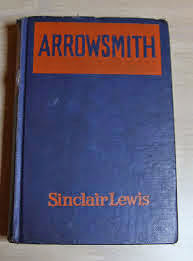So there on the home bookshelf sat the acquisition, taking up the space unread books take up, potential, seemingly limitless opportunity to get around to it, space that might (who knows?) be better used.
The book log entry for Arrowsmith is longer than most. The first paragraph gives a thumbnail of the plot, from beginning to end. It’s not till the second paragraph that one gets to my discontents.
from the book log (1/8/89):
Arrowsmith by Sinclair Lewis
This novel took a while to read. And not, I think, just because it is over 400 pages in length. Martin Arrowsmith becomes a doctor during the course of the novel, marries Leora. He attends medical school in the state of Winnemac, goes to practice as a country doctor in Leora’s hometown, Wheatsylvania in “the Dakotas,” moves on to the medium-sized city of Zenith where he works for the Dept of Public Health, on to Chicago for a year as a pathologist in an expensive private clinic, on to New York where he works at the McGurk Institute, a scientific research institute, under the guidance of his old medical school teacher, “pure” scientist, and minor demi-god Max Gottlieb. Martin, Leora, & Sondelius, a worldwide crusader against epidemics, go to the Caribbean island, St. Hubert, to defeat the plague with bacteriophage. Leora dies; Sondelius dies; back in NYC Martin is acclaimed, marries the very rich Joyce Canyon (who was also on St. Hubert during the plague). Eventually Arrowsmith chucks it all to go back to “pure” research in the wilderness with colleague Terry.
The edition also includes an Afterword by Mark Schorer. He calls the ending, “a little fantastic … and quite unpersuasive.” I agree. I thought Martin a boob. I liked him some, found him at least interesting enough to want to know what would happen next. But his addiction to “scientific method” in the midst of the plague was never adequately explained — because the experiments were not perfect [the researchers] couldn’t tell [whether] the bacteriophage was really what was curing people. Yet [sick people] were doing a pretty good job of being cured. This reminds me a bit of the conflict over AIDS treatment. When we’re talking terminal illness, making noises about imperfect controls — meaning some people are not given treatment, treatment is actively withheld — seems pretty ridiculous. No experiment is going to be perfect because there are always going to variables that aren’t considered. If it helps, isn’t that what matters? Even if it just seems to help, that’s important too. My favorite character was Leora. I dint think Martin deserved her. She did annoy me in being rather vacant. I didn’t find Gottlieb as sympathetic as he was supposed to be.
In my recent visits to Sebastopol I’ve found some decent items on the Friends sale table.

No comments:
Post a Comment